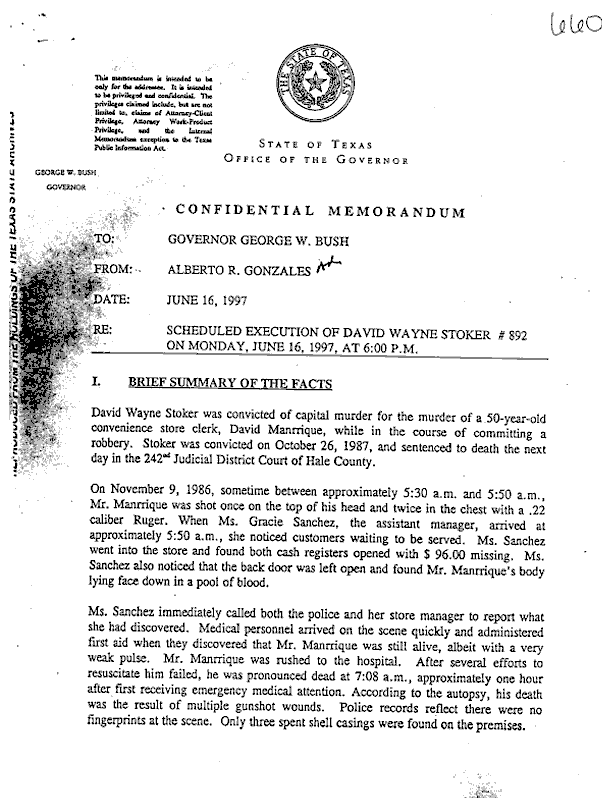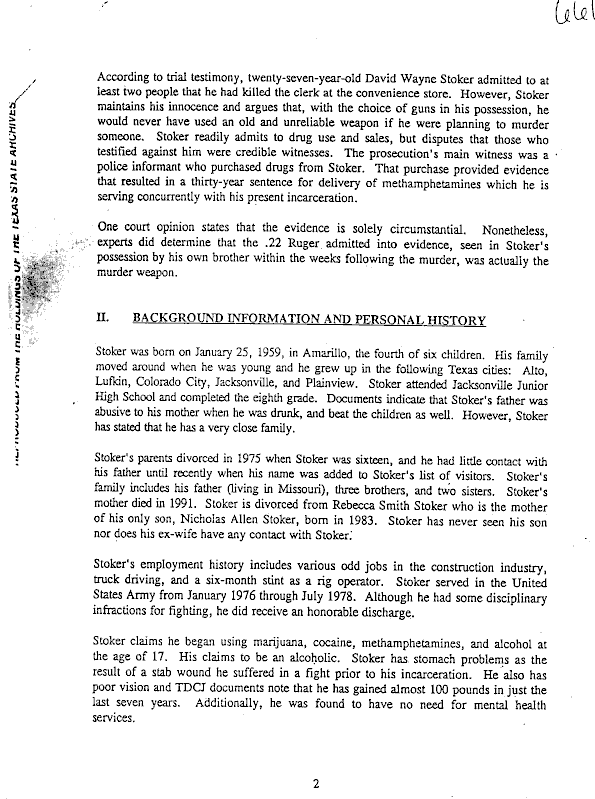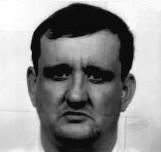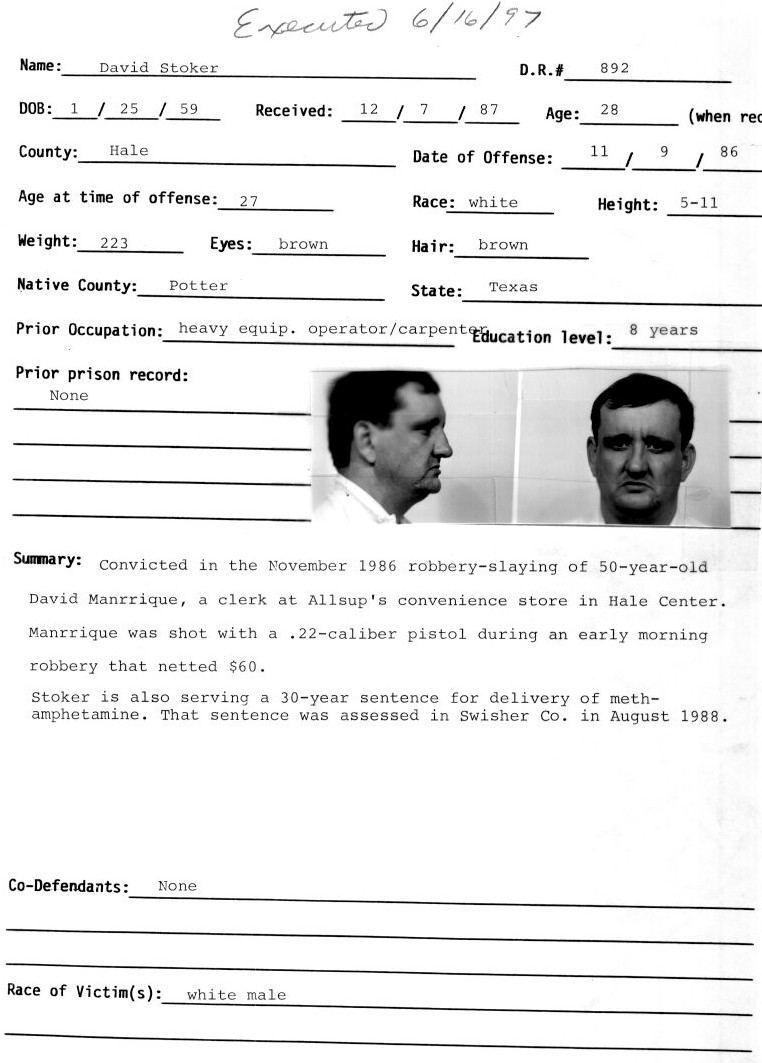Texas Executes Inmate In Murder of Store Clerk
June 17, 1997
New York Times
An inmate was executed today for the fatal shooting of a convenience store clerk in a $96 robbery in 1986.
The prisoner, David Stoker, 38, left a note professing his innocence. To the victim's family, he wrote: ''I am truly sorry for your loss, but I didn't kill anyone. The D.A. knows this. I do wish you peace and comfort.''
Mr. Stoker was convicted of killing David Manrrique, a Baptist minister working part-time in the store, in the north Texas town of Hale Center.
The Hale County District Attorney, Terry McEachern, who prosecuted Mr. Stoker, said that there was ''no question about his guilt.''
Five members of the victim's family witnessed the execution.
Clemency denied
By Steve Mills, Ken Armstrong and Douglas Holt - Chicago Tribune
Sunday, June 11, 2000
With capital punishment emerging as a major national issue, it likely will become part of the presidential campaign. The presumptive Democratic nominee, Vice President Al Gore, also supports the death penalty, but he has never held an office where he would authorize an execution or grant clemency.
The case of David Wayne Stoker, executed June 16, 1997, illustrates many of the problems in Texas' death penalty system.
The star witness was paid by a crime-stopper program and had drug charges against him dropped. The district attorney's investigator and the police gave false testimony. Stoker's lead attorney surrendered his law license less than two years after Stoker's trial and pleaded guilty to criminal charges. Stoker's other court-appointed attorney had been a lawyer less than a year.
Stoker's case was so troubling for Thomas Moss, a Bush appointee to the Board of Pardons and Paroles, that he voted to grant Stoker clemency—one of only two times he has favored commuting a death sentence. In a letter to one of Stoker's sisters, Moss said he believed there was "the possibility that [Stoker] was innocent."
The board usually denies clemency requests without dissent.
Stoker, a carpenter and handyman, was convicted and condemned for the 1986 murder of a convenience store clerk in Hale Center, a small, dusty town just north of Lubbock. The gunman shot the clerk three times and stole $96.
Five months later, Carey Todd, a man prosecutors described later as a "low-life scum drug dealer," went to police and implicated Stoker. He also gave police the murder weapon. One month later, authorities arrested Stoker, who had an assault conviction and, according to his own lawyer, was involved in drugs.
To defend Stoker's life, a district court judge appointed Ronald Felty and Gary A. Taylor.
Felty, the lead lawyer and a former prosecutor, later gave up his law license in the face of disciplinary action. Felty forged the signatures of two clients on a settlement check, then pocketed the money, records show. He also pleaded guilty to felony charges for forging a judge's signature on a court order and falsifying a government document. He was sentenced to 5 years of community service.
Taylor had been a lawyer only 11 months when Stoker stood trial in October 1987.
Stoker's lawyers alleged that although the jury did not know it, Todd had ample motive to lie.
Under questioning by the prosecutor, Todd said he received nothing for his testimony. But, according to court records, Todd was facing drug and weapons charges in nearby Potter County. On the day he testified, those charges were dropped. Moreover, he received a $1,000 crime-stoppers reward passed on to him by the Hale County district attorney's office.
Stoker's appellate attorneys found documents that, they say, indicate the charges were dropped against Todd in exchange for his testimony. Those documents include a telephone message showing that Hale County District Atty. Terry McEachern called a Potter County prosecutor regarding Todd's case. The other prosecutor noted in his court file, "Dismissed: this defendant helped Terry McEachern D.A. solve a murder case."
Hale Center's police chief, Richard Cordell, testified there was no local crime-stoppers' group but was forced to acknowledge on the witness stand that he was, in fact, one of the group's founders.
Riley Rogers, an investigator for the district attorney's office, took the stand and denied any knowledge of the $1,000 payment. The appeals team later uncovered bank records that linked the $1,000 payment to him.
In a recent interview, McEachern denied that Todd's drug charges were dropped in exchange for his testimony, but he acknowledged Todd received reward money with the help of his office.
"Yes, the record indicates that that happened," McEachern said. "Is that of substantial importance? I don't know whether I wore white socks or blue socks on that day, and I really don't think it matters."
Todd testified that Stoker had given him the murder weapon following the shooting. Stoker never disputed he had the gun at one point; he said he got it from Todd, who asked him to repair it. Stoker said he then returned the gun.
Two other prosecution witnesses, Ronnie Thompson and his wife, Debra, testified that Stoker bragged about the murder.
Ronnie Thompson, who works cotton and corn fields in Hale County, has maintained for years his statement to police and his testimony were false—the result of pressure from his wife, who had become romantically involved with Todd and was angry at Stoker.
"I told McEachern I didn't mean to sign it," Thompson said of the police statement. "He said, 'It's too late. You signed it."'
McEachern denies pressuring Thompson to testify untruthfully.
Debra Thompson stuck by her testimony in a brief interview, while Todd, who works as a laborer for an irrigation company, declined to comment.
Prosecutors claimed a shell casing found in Stoker's car also linked him to the murder, but Stoker didn't own the car when the crime occurred. He bought it months later, according to records unearthed by his appellate attorney.
During sentencing, McEachern called Dr. James P. Grigson, the psychiatrist nicknamed "Dr. Death." Although Grigson never examined Stoker, he testified Stoker was a sociopath who would "absolutely" be violent again.
Grigson was one of the state's most feared witnesses, but Felty assigned the inexperienced Taylor to cross-examine him. With Stoker's life in the balance, Felty put on only one witness at sentencing: Stoker's mother. She testified briefly about the most superficial aspects of the Stoker family.
Felty, who works as a supervisor at Home Depot, defended his work. "When we went to trial, we were a hell of a lot better prepared than the D.A.'s office," Felty said.
McEachern said he had no doubt he prosecuted the right man. "Twelve jurors believed [the witnesses] were credible and reliable," he said.
Sutton, Bush's criminal justice aide, said the courts had an opportunity to review all these issues on appeal and found they did not merit a new trial. He described the evidence against Stoker as "very strong" but not overwhelming.
In recent interviews jurors said that had they known of the problems with the Stoker case, they might have reached a different verdict.
"I don't know that we would have believed everything," said juror Myron Grisham. "Knowing [Todd] was paid or he got a deal, I would have had a harder time believing his testimony."
Said Wanda Carter: "If we had known some of these things, I'm sure it would have weighed on us."
Police Chief Cordell acknowledged there was no "direct tie" between Stoker and the crime.
"I was really surprised we did what we did with the amount of evidence we had," he said.






